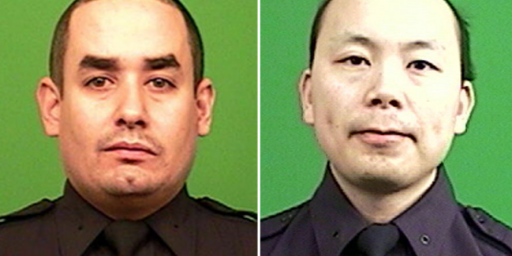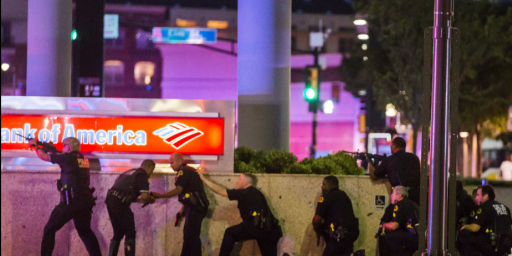The De Menezes Killing
A little over two years ago I blogged about the Jean Charles De Menezes shooting by the Metropolitan Police (the Met) in the London underground. The Met believed, mistakenly, that De Menezes was a terrorist and shot him in the head in a crowded subway train. Well now it turns out that a court has ruled that the De Menezes shooting was not in policy.
The Metropolitan police was today found guilty of a catastrophic series of errors during the operation that led to firearms officers shooting Jean Charles de Menezes dead on the London underground.
[…]
De Menezes was shot seven times in the head by police who mistook him for one of four men who had failed to detonate bombs on the capital’s transport system the previous day, the court heard during the four-week trial.
The prosecution alleged that the police operation to follow and stop the 27-year-old – who lived in the same south London block of flats as the terror suspect Hussein Osman – was carried out “so badly that the public were needlessly put at risk”.
One rather disturbing part of the verdict is that apparently nobody really was to blame though. The head of the Met, Sir Ian Blair was not in anyway responsible. The commander of the operation was not responsible for getting a many killed, she was promoted. It isn’t clear that the officer who was supposed to be watching for when De Menezes was leaving and going to the bathroom was responsible for failure to do his job. Apparently the police screwed up by not having any single officer anywhere involved in the operation screwing up. It was wrong to shoot De Menezes in the head multiple times, but nobody really made a mistake. Try to figure that one out.
This article in the Telegraph raises similar issues.
So how did the mistakes happen? The verdict blamed “the organisation” and “managerial failures”. Yet no individual manager was deemed responsible for any managerial failure, or for any failure of the organisation.
How any such failures could have happened without some individual making an error, either at the level of policy, or at the level of an individual decision, is beyond me. But I’m in good company: the prosecution, the judge and the jury couldn’t resolve that condundrum either.
The article then goes off the rails after that though,
The prosecution seems to have been the consequence of a vague desire to ensure that the “same thing does not happen again”. Its most likely effect, however, is that something much worse will.
When applied to the police and the other emergency services, health and safety legislation induces paralysis. It does not make officers do the right thing. It makes them do nothing, because you cannot be prosecuted for doing nothing.
I’m sorry, but we are giving certain agents of the state broad powers and arming them and then sending them out with instructions to shoot people if necessary. I’d like to make sure that, as an innocent bystander, I don’t get shot, my wife doesn’t get shot, and so on. Is that really too much to ask? Given that we are, once again, arming these agents, giving them broad powers to detain, arrest and shoot people, asking them to perform at a high standard seems like a reasonable request.
In the case of dealing with terrorism, the consequences of officers doing nothing could be horrendous.
Yes, it could very well be horrendous. It also could very well be part of the cost of living in a free society. Pushed to its extremes this is the kind of thinking that leads to the nanny state mentality. We must protect people from not only the bad guys, but themselves as well. After all, unbridled excesses in eating has been claimed to lead to 400,000 premature deaths due to obesity.1
_____
1Not really, but it sure does sound horrendous; horrendous enough that the government should step in and do something about it.





This piece is quite badly written and poorly expressed in a number of places and ought to have been done with more care.
As near as I can follow your logic, I disagree. A mistake was made. You want someone to “pay” for that mistake. Think about what you are really asking for. Not in the perfect 20-20 hindsight of this case, but as it was happening.
If the police knew that if a mistake was made and they accidentally shot the wrong guy, no matter how certain they were that they had a guy who was an imminent threat, the police would have been thrown to the wolves, do you think they would have hesitated? Absolutely. That would be human nature. Only those who don’t think they could make a mistake or who aren’t smart enough to allow the possibility of a mistake wouldn’t have that threat slow them down.
So let’s go with your logic and throw the book at everyone up and down the chain. The trigger man gets life (no death penalty over there). The stake out guy gets 10 years for accessory to murder. The managers get 20 years, etc.
But there is a catch. Just as the police involved here had to make a decision and live with it, so do you. But the deal is from now on, if any terrorist could have been stopped but the police hesitated for fear of being thrown to the wolves if they made a mistake, and someone gets killed by the terrorist, you die (we do have the death penalty over here). You are taking personal responsibility for “doing what is right no matter what” and in turn causing the police to hesitate. If you are right and we live in a better world with the terrorists being just as likely to be stopped and the police less likely to make a mistake, great. If you are wrong, you have personally put your life on the line. You will get a trial, they have to prove that the cop hesitated because he feared a witch hunt if he made a mistake, but if they prove that the sentence is mandatory.
Do you feel that the idea is such a good one if that is the deal?
Of course, you have had a lot more time to think about this than the cops in the metro station did. So you can’t complain that you didn’t realize what was going on. If you didn’t realize that the implications of writing the post were, that you would be put into such a bargain, that is your mistake. And of course, any mistake must be paid for.
The bottom line is that not all mistakes require a scapegoat. Some things, no matter how tragic the outcome, some things are just a mistake. Not a willful act, but a mistake. Should there have been two guys on stake out so one could take a whiz while the other one watched? In hindsight, sure. But how many times have the stakeouts not had a problem and how much more do we pay in taxes to fund the additional manpower? Should the policeman who fired the shots have had a less lethal alternative (such as a taser)? Sure, in hindsight. But what if the less lethal weapons had let the guy get away and set off a bomb. We know now he wasn’t a threat, but not at the time.
So what is the ratio of people killed by terrorist in London subways vs those killed by police in trying to prevent people being killed by terrorist? About 77 to 1, I think. Not exactly police gone wild is it? Unless you expect perfection with no mistakes. But then you signed up for that now haven’t you.
p.s. I am using the example of you being subject to the death penalty if you contribute to someone else’s death by terrorist by slowing down police reaction as an example. In no way is it a ‘death threat’.
Superb! Linking a rightwing wet dream to a leftwing wet dream.
Yea, thank god the deaths of 3,000 people 5 years ago hasn’t lead to throwing the constitution out the door, several major treaties, the torture and holding of persons without counsel or the illegal wiretapping of citizens in the US.
I mean, that would really, really be far worse than anything any liberal wanted to do, like make you see your doctor every year.
Glad we dodged that bullet.
Hal, I guess we should consider what didn’t happen since 9/11. Well, unlike the last attack on US soil in 1941, we:
– Haven’t interned a couple of hundred thousand into camps based upon race.
– Actually haven’t imposed censorship on press.
– If as you suggest we’ve tortured, wiretapped, and held folks without counsel then for these transgressions we are no better than we were in 1941. So despite the howls of righteous indignation perhaps we should acknowledge our response has been more measured but not perfect.
Yetanotherjohn – well framed response.
Ye gods. Yes, let’s keep lowering the bar until we need to start dredging the Marianis trench because it’s still not low enough. Pretty soon, you’re going to reach the center of the earth and then what ya gonna do?
Seriously… This is supposed to be a criticism of my comment? “We haven’t actually started rounding people up in internment camps, so we’re better than a nanny state where people have mandatory checkups like those nanny state liberals want to do?”
Geebus.